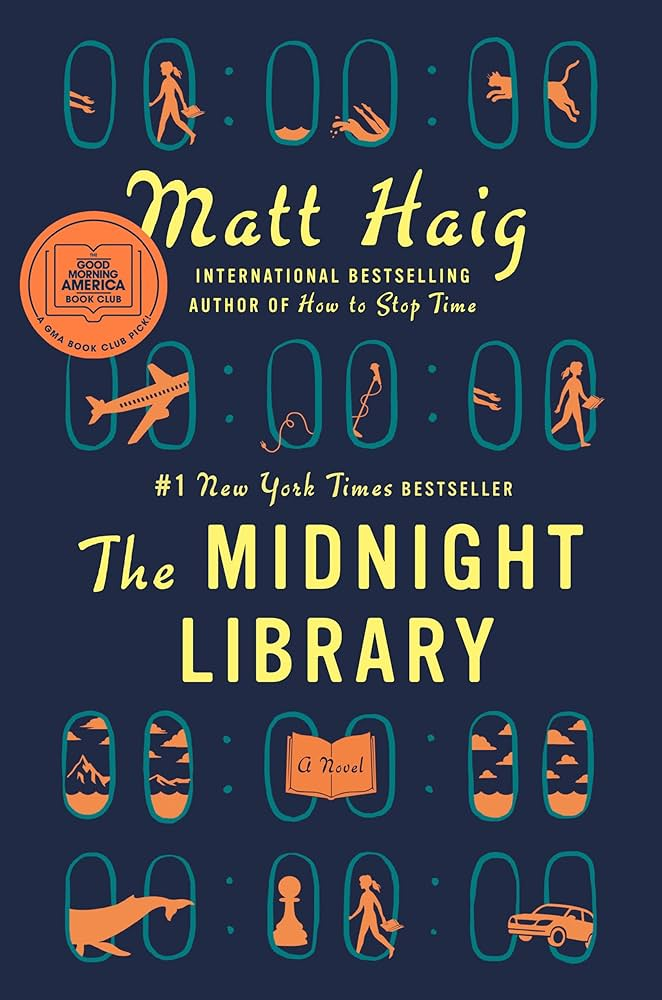
Favourite Quotes
“You can choose choices but not outcomes” - p. 83
“You don’t have to understand life. You just have to live it.” p. 283
“It’s not what you look at that matters, it’s what you see.” p. 242, Henry David Thoreau
Summary
- follows the story of a mid-30s depressed woman named Nora
- she decides to take her life one day after losing her cat, the last person/entity that she loved.
- she ends up in a place between life and death: the midnight library
- in this library, Mrs. Elm the librarian shows her the book of regrets. It’s full of regrets from Nora’s life. There are millions of books on the shelves. These represent all the possibilities of Nora’s life. The library allows her to experience a different life had she made a different decision in her root life
- for example, in one life/book she is a retired world-renowned Olympic swimmer. In this life she goes on tour giving speeches.
- in another life, she is a professor and mother to a daughter. This life teaches her the strong principle of love. She realizes her root life lacks love
- the whole purpose of the midnight library was to show Nora that she actually did truly want to keep living. It shows her that as long as there’s life, there’s hope and potential in the future. You can be anything you want to be!
- so she goes back to her root life and decides to CHOOSE to live.
Notes and Quotes
- “You can choose choices but not outcomes” - p. 83
- The best you can do is make the best possible choices in your specific circumstance. How those choices ultimately play out is out of your control for the most part.
- This teaches us to ‘let go’. Just try your best and leave the rest to the universe and God.
- Sometimes regrets aren’t based on fact. Sometimes it’s our own imagination causing us to think that x thing is a regret.
- “sadness is intrinsically part of the fabric of happiness. You can’t have one without the other.” - p. 179
- The only way to learn is to live
- “She hadn’t tried to end her life because she was miserable, but because she had managed to convince herself that there was no way out of misery. That was the basis of depression as well as the difference between fear and despair. Fear was when you wandered into a cellar and worried that the door would close shut. Despair was when the door closed and locked behind you.” p. 215
- this is an interesting take on depression. It’s not about your current state, but about the future, your potential, hope, etc. This is a common theme and idea in this book. That what really matters it what comes next. You have a lot in store for the future. Everyone has potential.
- Nora comes out of her depression when she realizes all the other possible lives she has are a possibility for her. She has potential to become those versions of herself.
- as long as you live, there is hope and potential
- reminds me of War and Peace. Pierre says “where there is life, there is happiness.” And of course, fulfilling your potential will bring you great happiness.
- life will never be free from pain, despair, grief, heartbreak, hardship, loneliness, depressions.
- nice analogy from the book about depression. It’s like swimming underwater. But once you can understand the concept of hope and potential in your life, it would be like swimming with goggles. Yes, you’re still underwater, but at least you can see where you’re going and maybe make your way above the water.
- “When she though of her root life, the fundamental problem with it, the thing that had left her vulnerable, really, was the absence of love.” -p. 248
- when Nora was reflecting on her life, she realized it all boils down to love. The lack of love in one’s life can cause deep depression. Humans need to feel love and need to love others.
- your small actions may lead to big impacts for others
- Nora takes out an hour once a week to teach Leo piano. It turns out, in another life where Leo stopped these lessons, he ended up being a delinquent and criminal.
- perspective is very important. As Thoreau says “It’s not what you look at that matters, it’s what you see.” p. 242
- depression can often be due to having a negative perspective on things. Simply changing this can improve your condition.
- chess is a good analogy for life moving forward for Nora. She plays chess at the very end of the book with Mrs. Elm. There are many possible moves when playing chess, at all times during the match. That’s life. You always have many different possibilities for your future.
Reflections
I really enjoyed the read. I feel like it could’ve been longer to include more depth in the story and character. Also, the other guy she meets who also drifts between lives… what was the purpose of him being in the book? I don’t understand that.